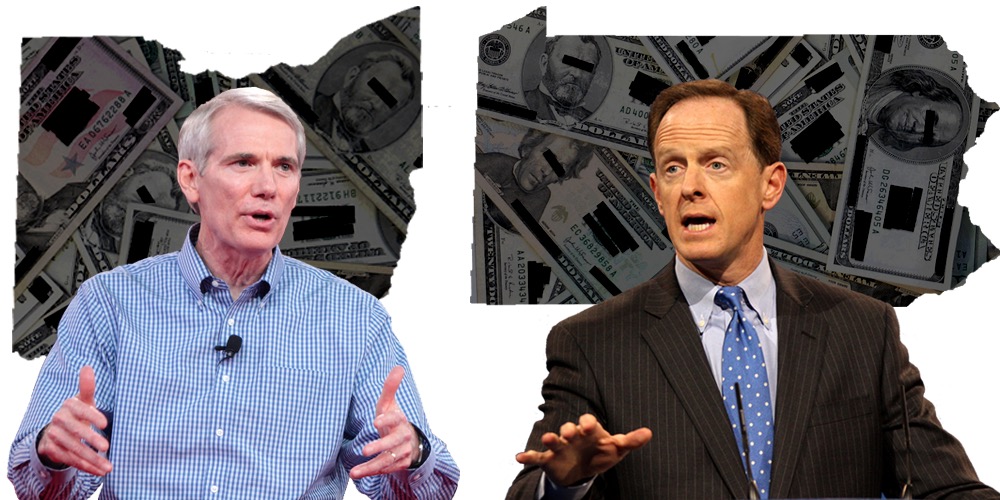
David and Charles Koch. Illustration by DonkeyHotey (Creative Commons).
Washington – If you’re tempted to think campaign megamillions no longer matter because maverick Republican Donald Trump is a self-financed near-nominee and Bernie Sanders has fomented a nationwide rebellion on a tide of two million small donors, take a look down-ballot. MegaMoney is flooding into a high stakes battle for control of Congress.
Despite this quirky campaign 2016, super PAC war chests and the lava of dark money donations are on track to hit another record in this election. The $707 million in super PAC funding is already double the level at this stage in 2012. And huge hunks of that campaign hoard are being rerouted into state races for senator, governor and Congress.
The billionaire Koch brothers of Wichita, Kan., David and Charles, are openly abandoning the GOP presidential race after having backed a bunch of losers – Jeb Bush, Carly Fiorina, Marco Rubio, and Scott Walker – and have pivoted their $900 million network of super-rich donors into the war over the Senate. In a quick shift last month alone, three Koch-led groups pumped $4 million into hotly contested Senate races in Ohio, Nevada and Wisconsin.
The Kochs are a weathervane, signaling the high anxiety among Republican strategists and super donors who are in a panic over the dark scenario they imagine from a Trump candidacy. The down-ballot collateral damage that they expect could cost the GOP its control of the Senate, the loss of a few key governors and some mainstream House Republicans.
Two months ago, at a closed door session with Republican governors, GOP campaign guru Karl Rove didn’t mince words. Trump at the top of the Republican ticket, Rove said, spells catastrophe for the party. According to an inside account pieced together by The New York Times, Senate Majority Leader Mitch McConnell said that if it came to their own survival, incumbent Republican senators could run negative ads against Trump. “We’ll drop him like a hot rock,” McConnell snorted.
McConnell’s angst is understandable. Twenty-four Republican Senate seats are up for election this fall, some held by freshman senators swept into office by the Tea Party wave of 2010. The loss of just four seats would cost the GOP its Senate majority and most analysts see six GOP seats in trouble – in Florida, Illinois, Ohio, New Hampshire, Pennsylvania, and Wisconsin. The retirement of Senate Democratic leader Harry Reid of Nevada gives Republicans a chance to pick up that open Democratic seat.
But the drag of Trump looms like the Sword of Damocles over the GOP’s Senate prospects. Former Illinois Republican Chairman Patty Grady candidly worries that the Trump effect may sink Illinois’s one-term GOP Senator Mark Kirk. “If he’s our nominee, the repercussions of that in this state would be devastating,” says Grady.

Two Republican senators facing tough races. Sen. Rob Portman (left) of Ohio, and Sen. Pat Toomey (right) of Pennsylvania. Illustration by Reclaim from photos by Gage Skidmore (candidates) and Tracy O (money). (Creative Commons).
Next door in Ohio, veteran GOP campaign strategist Bryan Walsh fears for Republican Senator Rob Portman. “He is very well prepared, has tons of cash in the bank, and he got his campaign organized and up and running early,” Walsh told New York Times reporter Jonathan Martin. “But if we nominate a bad presidential candidate like Trump, senators like Portman or Kelly Ayotte (in New Hampshire) aren’t going to be able to outrun Hillary [Clinton] by that much, and there goes the Senate.”
That pervasive Republican fear is a powerful spur for GOP super PAC donors. Conservative donors have contributed nearly 70 percent of the $707 million in SuperPAC money raised to date, according to the Center for Responsive Politics. In the hot Senate races in Ohio, Pennsylvania and Wisconsin, Super PACs, candidates and parties on both sides have raised war chests that already total from $23 million to $32 million in each state.
In Wisconsin, a political rematch pits former Democratic Senator Russ Feingold against Republican incumbent Ron Johnson. With polls showing Feingold in the lead, Americans for Prosperity, flagship of the Koch network, last month injected $1 million to give Johnson a boost, joined by big money from the ardently pro-business Club for Growth and Sheldon Adelson, the Las Vegas gambling magnate and GOP megadonor.
In Ohio, three Koch groups – Americans for Prosperity, Freedom Partners, Chamber of Commerce and Concerned Veterans for America — have put $2 million into a negative ad campaign against former Governor Ted Strickland, the Democrat running to unseat Portman.
In Pennsylvania, conservative Republican Pat Toomey, whose intraparty challenge chased former progressive Republican Sen. Arlen Specter out of the GOP in 2010, faces a tough re-election fight. Even before former Clinton-Gore aide Kathleen McGinty emerged the strong winner of a late April Democratic primary to become Toomey’s challenger, pro-Toomey PACs had banked a multimillion-dollar war chest from the Club for Growth, the Koch network and the U.S. Chamber of Commerce.
A similar funding pattern prevails in other pivotal Senate races – In Illinois, where Democratic Rep. Tammy Duckworth is challenging Republican incumbent Mark Kirk, and in New Hampshire, where the sitting Democratic governor, Maggie Hassan, is running to unseat Tea Party conservative Kelly Ayotte. There, as elsewhere, pro-business groups, the Koch network and Karl Rove’s Crossroads America are usually the main Republican funders while Democratic super PACs get their major funding from billionaires such as George Soros and Tom Steyer, from WomenVote! the campaign arm of Emily’s List, and from labor PACs like that of the Service Employees International Union.
Given the high stakes in the Senate, the financial pressure is on. “The minute Trump gets the nomination, the party is going to have to raise another $300 million or $400 million,” comments Al Hoffman, a former Republican Party national finance chairman.
But not to help Trump, Hoffman admits. This year, he says, he’ll spend his campaign dollars on a local Florida candidate for Congress and to help re-elect his personal friend, Arizona’s Senator John McCain. “All the donors I’ve talked to,” says Hoffman, “have said they want to sit out the presidential and just focus on the Senate and House.”
This article was originally published on ReclaimTheAmericanDream.org

